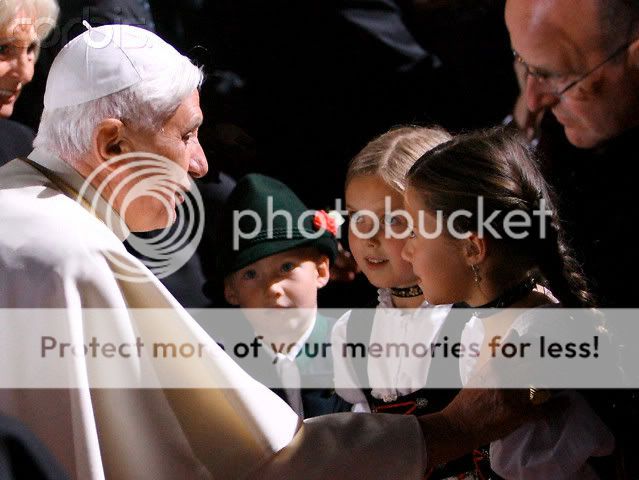The text of the Pope’s homily at the ecumenical celebration of Vespers in the Regensburg cathedral:
We are gathered here – Orthodox Christians, Catholics and Protestants – to sing together the evening praise of God. At
the heart of this liturgy are the Psalms, in which the Old and the New Covenant come together and our prayer is joined to the Israel which believes and lives in hope. This is an hour of gratitude for the fact that we can pray together in this way and, by turning to the Lord, at the same time grow in unity among ourselves.
Among those gathered for this evening’s Vespers, I would like first to greet warmly the representatives of the Orthodox Church. I have always considered it a special gift of God’s Providence that, as a professor at Bonn, I was able to come to know and to love the Orthodox Church, personally as it were, through two young Archimandrites, Stylianos Harkianakis and Damaskinos Papandreou, both of whom later became Metropolitans. At Regensburg, thanks to the initiative of Bishop Graber, further meetings occurred: during the symposia on the “Spindlhof” and with scholarship students who had studied here. I am happy indeed to recognize some familiar faces and to renew earlier friendships. In a few days time, at Belgrade, the theological dialogue will resume on the fundamental theme of koinonia in the two aspects which the First Letter of John indicates to us at the very beginning of its first chapter. Our koinonia is above all communion with the Father and with his Son Jesus Christ in the Holy Spirit; it is communion with the triune God, made possible by the Lord through his incarnation and the outpouring of the Spirit. This communion with God creates in turn koinonia among people, as a
participation in the faith of the Apostles, and therefore as a communion in faith – a communion which is “embodied” in the Eucharist and, transcending all boundaries, builds up the one Church (cf. 1 Jn 1:3). I hope and pray that these discussions will be fruitful and that the communion with the living God which unites us, like our own communion in the faith transmitted by the Apostles, will grow in depth and maturity towards that full unity, whereby the world can recognise that Jesus Christ is truly the One sent from God, the Son of God, the Saviour of the world (cf. Jn 17:21). “So that the world may believe”, we must become one: the seriousness of this commitment must spur on our dialogue.
I also extend warm greetings to our friends of the various traditions stemming from the Reformation. Here too many memories arise in my heart: memories of friends in the Jäger-Stählin circle, who have already passed away, and these memories are mixed with gratitude for our present meetings. Obviously, I think in particular of the demanding efforts to reach a consensus on justification. I recall all the stages of that process up, to the memorable meeting with the late Bishop Hanselmann here in Regensburg – a meeting that contributed decisively to the achievement of the conclusion. I am pleased to see that in the meantime the World Methodist Council has adhered to the Declaration.
The agreement on justification remains an important task, one not yet fully complete: in theology justification is an essential theme, but in the life of the faithful today – it seems to me – it is only dimly present. Because of the dramatic events of our time, the theme of mutual forgiveness is felt with increased urgency, yet there is little perception of our fundamental need of God’s forgiveness, of our justification by him. Our modern consciousness in general is no longer aware of the fact that we stand as debtors before God and that sin is a reality which can be overcome only by God’s initiative. Behind this weakening of the theme of justification and of the forgiveness of sins is ultimately a weakening of our relation with God. In this sense, our first task will perhaps be to rediscover in a new way the living God present in our lives.

